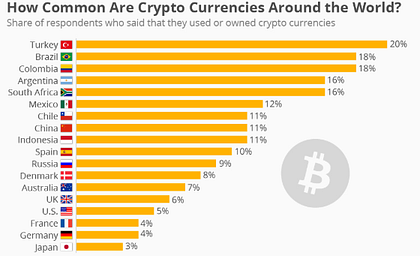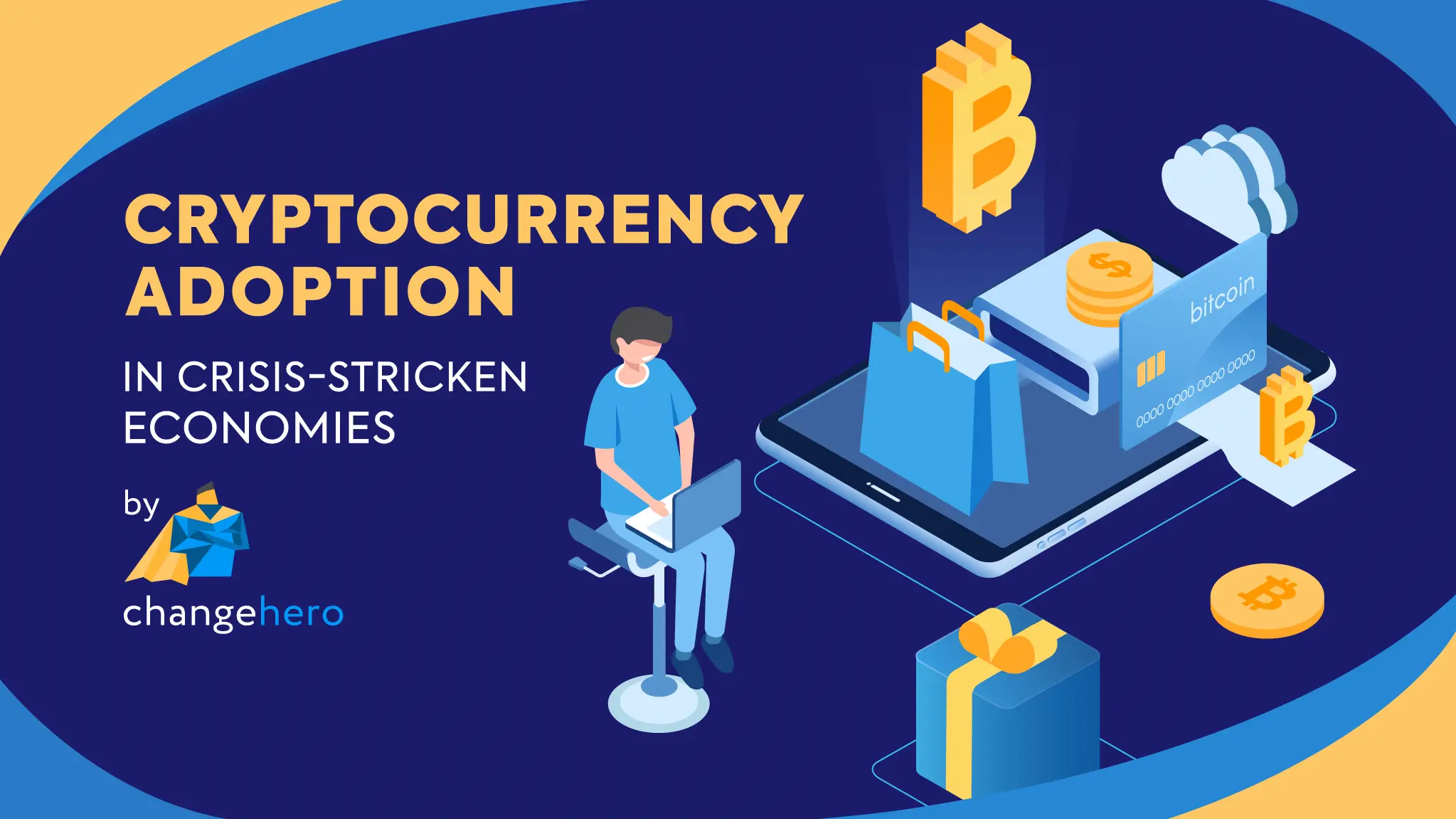ChangeHero Brings You the Other Side of Crypto
We are living in a digital age. Cryptocurrency has seen significant growth in the past five years — from an upsurge in price to an increase in adoption around the world. Despite being young, crypto has become an effective financial tool to solve a lot of economic problems like inflation, poverty, lack of access to banking services, reducing transaction costs, etc. Cryptocurrencies are playing a vital role in the economic scene especially in poor and undeveloped countries with struggling economies.
Why are people turning to crypto in crisis-stricken countries? What Third World countries mostly feel friendly to the crypto? Can crypto be an effective solution to economic setbacks?
ChangeHeroes did some research and found some interesting facts about crypto adoption.
Cryptocurrencies are changing the way the world thinks about money. The main advantage of crypto — it’s decentralized, not regulated by the government or a single individual, which provides users with financial freedom and is considerably more secure than the traditional banking system. Crypto transactions can happen anywhere, almost all around the world without any restrictions just with an internet connection.
When speaking about crypto adoption we usually think about tech-advanced countries like the United States, Japan or South Korea. The growth of crypto is common not only in rich and progressive countries with developing financial infrastructures but also in economically struggling ones.
Here are some of the places in which cryptocurrency is playing a significant role in helping the people.
Let’s start with Venezuela — the most crypto-loving country on the planet.
The tense political situation in Venezuela has significantly affected local cryptocurrency adoption. The reason for the financial crash was hyperinflation. Consequently, people became unhappy, starving and poor. Under Venezuela’s President, Nickolas Maduro’s regime, the local currency was so much worthless, that it took up to half of a monthly wage to purchase a Big Mac at McDonald’s.
In 2017, when the inflation rate hit almost 500% in December, crypto came as a saviour. In the same year, Maduro authorized the country’s native cryptocurrency, Petro, which would be backed by Venezuelan barrels of oil. Venezuelans found their path to escape the consequences of inflation by mining crypto and turning to digital assets like Bitcoin. Thanks to cheap Venezuela’s electricity, that allows easy mining crypto from the blockchain.
As a result, in Venezuela, many people started working as freelancers and began to receive their wages in bitcoin because many do not have accounts abroad which would allow them to make transfers in dollars. Some of the most commonly used cryptocurrencies in the country are Bitcoin, Etherium, Litecoin, and Dash. Crypto helped the Venezuelan citizens lead a normal life by enabling them to transact and buy basic things for a living like medicine, toilet paper, diapers, food.
Here is a good example of the crypto-friendly organization Eatbch, which takes BCH donations and manage the purchases of ingredients to provide meals to people in 6 Venezuelan states. And that’s not all. Even two well-known food companies — Subway and Church’s Chicken — are accepting cryptocurrencies, according to CCN news.
When we talk about currencies, Dash is one of the most popular in Venezuela. By the end of 2018, Dash is reported to be accepted by over 2400 merchants. Recently, Dash announced that a Venezuelan Pharmacy franchise is accepting dash crypto payments. In addition, Dash also provides the community with the necessary training and development to the merchants about crypto.
By the way, crypto has also been used in Venezuela as a way of sending money, avoiding the fees associated with money transfer services such as Western Union. Some Venezuelans are using Bitcoin to store their savings, while others are using it to receive remittances from out-of-state relatives without an intermediary.
The African continent is witnessing a remarkable growth in the crypto adoption that must be discussed.
Cryptocurrencies are solving different economic issues. In South Africa, cross-border is a major concern due to high fees. With the help of Bitcoin, fees are declined to less than 3%, according to BitPesa CEO Elizabeth Rossiello. According to Statista, South Africa jumped to 5th place as 16% of the country’s population used cryptocurrencies like Bitcoin, Ethereum, Litecoin, Lisk, EOS, Dash, XRP, and Monero as investments or to buy something.
Crypto adoption looks like a reality in South Africa. There are crypto exchanges & transfer platforms like DoshEx, that provide banking for “unbanked” South African users with the help of blockchain and allowing them to exchange crypto.
Crypto-adoption is growing not only in South Africa but in the West African region too. This year Paxful crypto marketplace announced the completion of a new school in Rwanda, funded with BTC in collaboration with the BuiltwithBitcoin initiative. By the way, the team plans to build 100 schools in total, all throughout the continent of Africa. Ray Youseff, the CEO and co-founder of Paxful, told in his Twitter, BuiltWithBitcoin initiative group encourages the cryptocurrency sector to contribute more to humanitarian projects.
So Paxful is a good example of a cryptocurrency company that gives back to the community.
In Kenya, digital assets are moving more into real-world usage, there are a lot of stores and markets in the country, where people can purchase different kinds of things from food and footwear to mobile phones and bicycles. Here is another interesting example of using crypto in everyday life.
Beatrice Wambugu started a restaurant called Betty’s Place, located in the rural town of Nyeri, Nairobi. In the restaurant, customers are allowed to pay with two crypto-currencies — Bitcoin and Dash. The aim of her business not only to supply guests with delicious food but to attract different crypto-enthusiastic customers from different parts of the world to support the digital-coin adoption inside the town.
The additional clear proof of the mass-adoption growth in South Africa is the OKEx South Africa conference. OKEx will be joining the first-ever crypto event in South Africa — Crypto Fest 2019 on September 7 in Cape Town. This conference is dedicated to bringing crypto into daily life and offering crypto enthusiasts a convenient way of trading.
These examples show how the African continent is embracing crypto into their everyday life.
While crypto usage in South Africa is growing, in Turkey crypto-adoption is sky-rocketing. The devaluation of the national fiat currency, the Lira, has resulted in cryptocurrencies gaining popularity.

Therefore it isn’t surprising that Huobi Exchange is willing to expand its operations in Turkey due to the fact that 20% of the country’s population hold some cryptocurrency. The reason is mistrust in the banking system, where its fiat currency is exposed to inflation. Citizens in Turkey see crypto as a good investment opportunity and Bitcoin, the most popular cryptocurrency in Turkey, had been seen as an efficient way of escape.

This May, Zero Hedge hinted that the adoption of crypto is on the rise in Turkey and Turkish people bought around $20BN worth of crypto. Also, the number of Turkish companies accepting bitcoin as payment has increased widely. With crypto, people can invest in real estate, shop for furniture, curtains or books. Currently, 40 to 50 companies officially accept payment by BTC. There are also several Turkish companies like Miavita, Binbircesit, that accept payment by Bitcoin. Moreover, there are many brands in the world that accept cryptocurrencies, including WordPress, Subway, Microsoft, Reddit, Dell, Expedia, Zynga, Shopify, that allows making shopping with crypto in Turkey too.
As for other crypto-friendly countries with a high level of crypto adoption, Malaysia is another good example, where cryptocurrencies are classified as securities. Then goes Brazil, just like Turkey with its banks and corruption, suffering from inflation. Brazil accounts for 18% of the world’s cryptocurrency adoption. In Brazil, cryptocurrency usage is on the rise now. Minasul, a well-known Brazil’s coffee bean cooperative, plans to launch a blockchain-based digital coin called “Coffeecoin” backed by coffee supplies. This coin will enable Brazil farmers to purchase different sorts of farming and non-farming products.
Among crypto-friendly places, it’s also important to mention Argentina, where cryptocurrency is very popular across the country as well. Today Argentina is in third place with 16% of the world’s cryptocurrency adoption. The reason is the frequent crises that the country went through. Local companies, attentive to the crypto adoption boom, have carried out trade based on digital currencies (BTC and others). Crypto is accepted as payment in Recoleta Urban Mall, Walmart Supermarkets (in the branches of Av. Constituyentes in Capital, La Plata, Avellaneda, San Fernando, and Pilar), Chango Más, in Tigre, Bitcoin Argentina Foundation (Microcentro).
Benefits of Crypto Adoption?
With the help of crypto, millions of people save their money, invest, start a business, realize their dreams. There is no doubt that Blockchain is used to improve the quality of people’s lives, especially in third world countries by reducing fees, corruption level, which are some of the most important problems of struggling nations. Crypto assets replenish crippled economies by giving people an opportunity to trade irrespective of the economic situation of a country.
It’s also, needless to say, that crypto improves developing countries through the promotion of transparency, reduction of transaction costs. Moreover, with crypto people won’t need to rely on fiat which can be simply stolen, lost, or demolished by banks.
Crypto is for freedom. It might be a good chance to change the world.
What do you think about cryptocurrency adoption? Will it be mainstream in the near future? Let us know in the comments.
ChangeHero is always happy to see you at ChangeHero, Twitter, Facebook, Telegram and Blog.








